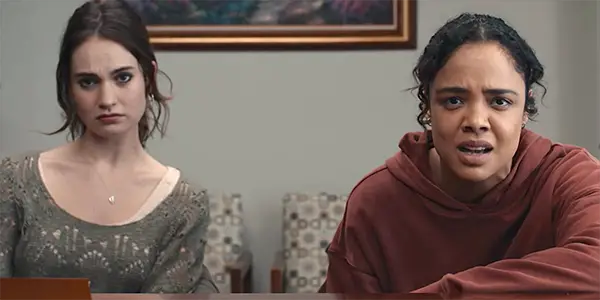LITTLE WOODS: An Affecting Indictment Of American Woes

Alex is a film addict, TV aficionado, and book lover.…
If America strikes you as a place filled with vulnerability, then Little Woods will hit a resonant chord. Vulnerability is its main tenor, its narrative drive, its raison d’être, and it does this by highlighting many hot button topics that make American life so tenuous.
Healthcare, opioids, and poverty are all complications for the people in the fictional town of Little Woods, North Dakota, a working-class community where seemingly everyone scrapes by. In particular focus are two sisters, Ollie (Tessa Thompson) and Deb (Lily James). Ollie is wrapping up probation on drug-related charges and doing odd jobs to keep the family home while Deb is waitressing and raising her son. Both should be taking time to recover from their mother’s death, but this gets pushed aside when Deb’s pregnancy brings their financial woes to the fore. Timelines are set, seemingly insurmountable costs are established, and the two sisters are forced to take extreme risks just to get through this difficult period.
The scale is small but the stakes are high, and yet the film keeps the drama in check. This is only one rough patch for one family in one small town, and this attention to scale is what allows the film to be both an indictment of the system as a whole and an affecting character drama.
The Stars Shine
Thompson and James are big gets for a film like this, and first-time writer/director Nia DaCosta rightly leans heavily on them. Granted, the actors are always crucial to character pieces, but the terse, unassuming approach DaCosta chose puts the onus on them to hint at but not over-explain the intentional gaps.

There’s a lot of things that, if explored more thoroughly, would make Ollie and Deb more immediately sympathetic. For instance, while Ollie benefited financially from trafficking and selling pills, there’s also the hinted-at fact that she was supplying a necessary market. Accessible and affordable healthcare doesn’t exist in the town, and the widespread ramifications of that are left for Thompson to communicate through Ollie’s gentle nature. She cares for people in every sense of the word, and Thompson gets that across without letting Ollie be whittled down to some angelic do-gooder.
The same goes for the more self-involved Deb, who has so many things on her plate that her more narrow-minded goals are understandable thanks to James’ simmering frustration. If a lesser performance was given, the character easily could’ve come across as whiny or dependent, but James maintains the tenuous sense that she’s being overwhelmed but not defeated.
Paired together, the two form a believable yin and yang, with the frustrations and steadfastness that come with lifelong relationships. This grounds the film in reality more successfully than any other aspect, and it makes their relationship the thing that sticks in your mind.
DaCosta Challenges The Viewer
As already mentioned, DaCosta isn’t spelling everything out for the viewer here, and that’s a bold approach for a first film. Knowing when to hold back and when to let exposition fly is a delicate art, and it’s one that DaCosta could use a bit more time perfecting.
While Thompson and James are able to fill in gaps with their characters, failing to fully establish the consequences of this world does leech the film of a forceful drive. DaCosta clearly lays out the timeline and the goals for these characters, but what specifically will happen if they fail to meet them is left unclear. What are their options if they lose the house? What would breaking probation mean for Ollie? Without these threats clearly hanging over them, the ticking clock isn’t as loud, and a bit of dramatic oomph is lost.

It’s understandable for DaCosta to trust the audience to figure out the gist of what would happen (you break the law, you’re probably going to jail), but it’s still important to adhere to tried and true storytelling methods. Known consequences drive up stakes, and the fact that the specific consequences to Ollie and Deb are unknown undermines the crime thriller element of the story.
Fitting Snuggly As A Western
One of the strongest choices DaCosta made was to place this film squarely in the arena of modern Westerns, which are undergoing a quiet resurgence in recent years. With the influence of Kelly Reichardt (Certain Women, Meek’s Cutoff) looming large, this is where cinema has gone to question the American dream, to poke at its failures, and to examine the people being sacrificed. It’s become a genre of reflection, and as such it fits perfectly with DaCosta’s story of a community being overwhelmed by nationwide failures.
Much of Reichardt’s signatures are prominent here: an unhurried pace, a female-driven plot, a palpable longing for some modest happiness. It’s not so much that DaCosta is willfully emulating Reichardt but picking up on the new conventions of the genre, and she sets up a mutually beneficial relationship between her film and the genre’s progression.
With each new addition, modern Westerns are shifting audience expectations towards character-driven stories with biting social themes. That Little Woods comes along right as the genre is solidifying itself means it can lean on these conventions while still feeling fresh; audiences haven’t been inoculated to this approach yet, allowing DaCosta to weave a tale of surprising complexity.
Conclusion: Little Woods
DaCosta makes a promising debut with Little Woods, showing an ambitious thematic depth while keeping the story affectingly small. Strong performances from Thompson and James get the film through some minor pacing issues and keeps the audience firmly rooting for the sisters. Above all, Little Woods gets across its messaging about the limited choices for America’s vulnerable working class without preaching, allowing the painful scenarios it portrays to speak for themselves.
What did you think of Little Woods? What was the most striking takeaway for you?
Little Woods will be released in the US on April 19th, 2019.
Does content like this matter to you?
Become a Member and support film journalism. Unlock access to all of Film Inquiry`s great articles. Join a community of like-minded readers who are passionate about cinema - get access to our private members Network, give back to independent filmmakers, and more.
Alex is a film addict, TV aficionado, and book lover. He's perfecting his cat dad energy.












